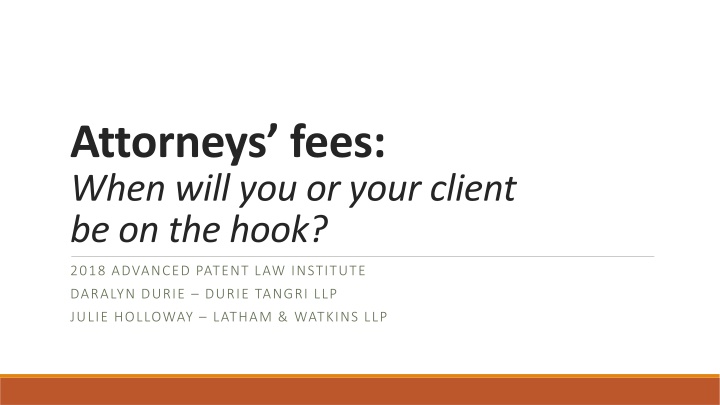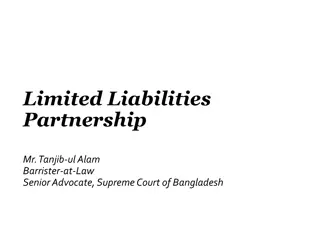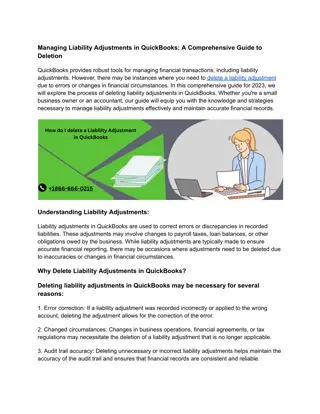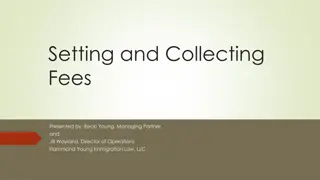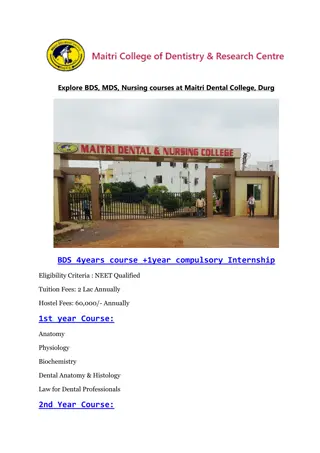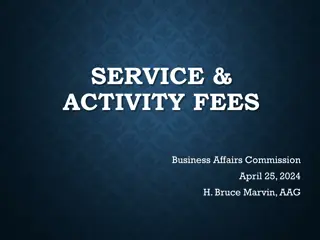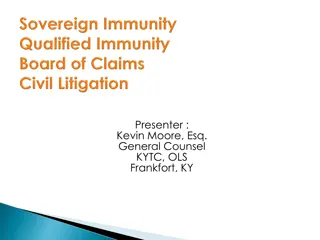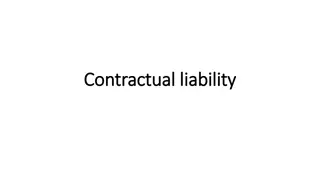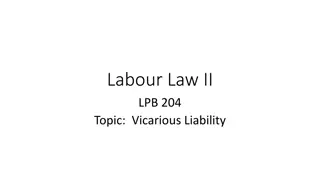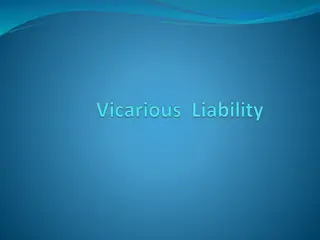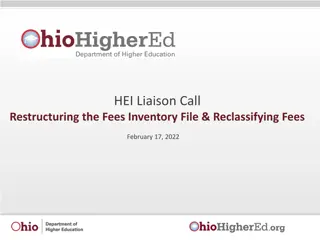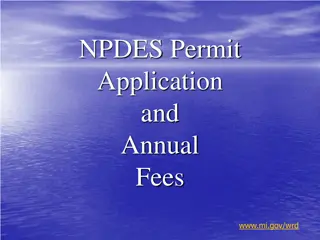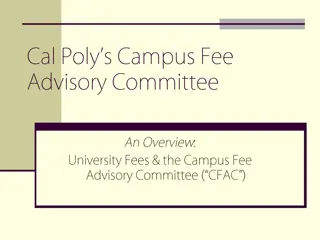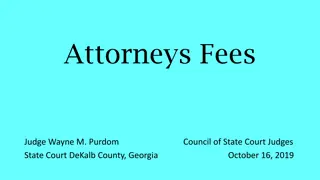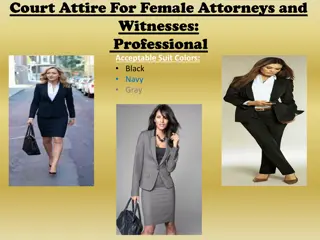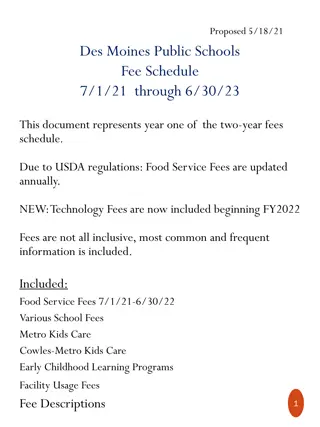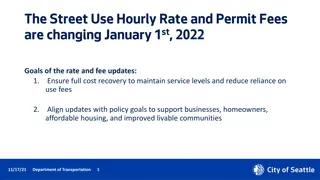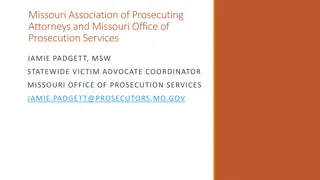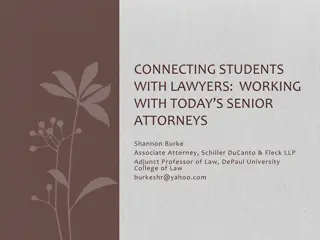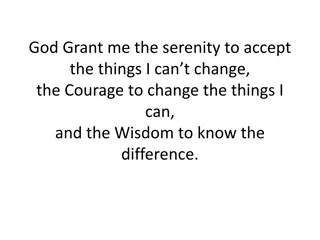Attorneys' Fees: When Is Liability Imposed?
Explore the allocation of attorneys' fees in legal cases, including bases for awarding fees, Rule 11 certification requirements, exceptional case scenarios, and practical examples from patent law. Learn about the implications and considerations surrounding attorney fee liability.
Uploaded on Mar 04, 2025 | 0 Views
Download Presentation

Please find below an Image/Link to download the presentation.
The content on the website is provided AS IS for your information and personal use only. It may not be sold, licensed, or shared on other websites without obtaining consent from the author.If you encounter any issues during the download, it is possible that the publisher has removed the file from their server.
You are allowed to download the files provided on this website for personal or commercial use, subject to the condition that they are used lawfully. All files are the property of their respective owners.
The content on the website is provided AS IS for your information and personal use only. It may not be sold, licensed, or shared on other websites without obtaining consent from the author.
E N D
Presentation Transcript
Attorneys fees: When will you or your client be on the hook? 2018 ADVANCED PATENT LAW INSTITUTE DARALYN DURIE DURIE TANGRI LLP JULIE HOLLOWAY LATHAM & WATKINS LLP
Bases for Awarding Attorneys Fees Federal Rule of Civil Procedure Rule 11 35 U.S.C 285 Exceptional Case 28 U.S.C 1927 2018 Advanced Patent Law Institute
Rule 11(b) By presenting to the court a pleading, written motion, or other an attorney or unrepresented party certifies that to the best of the person's knowledge, information, and belief, formed after an inquiry reasonable under the circumstances: 1) it is not being presented for any improper purpose, such as to harass, cause unnecessary delay, or needlessly increase the cost of litigation; 2) the claims, defenses, and other legal contentions are warranted by existing law or by a nonfrivolous argument for extending, modifying, or reversing existing law or for establishing new law; 3) the factual contentions have evidentiary support or, if specifically so identified, will likely have evidentiary support after a reasonable opportunity for further investigation or discovery; and 4) the denials of factual contentions are warranted on the evidence or, if specifically so identified, are reasonably based on belief or a lack of information. 2018 Advanced Patent Law Institute
Eon-Net LP and Zimmerman v. Flagstar Bancor, 653 F.3d 1314 (Fed. Cir. 2011) Federal Circuit upheld Rule 11 sanctions imposed on Eon- Net and counsel Zimmerman Zimmerman reviewed public information, generated claim chart Presuit investigation requires counsel to perform an objective evaluation of the claim terms Specification excluded accused web-based document processing 2018 Advanced Patent Law Institute
Exceptional Case Under Section 285 35 U.S. C. 285: The court in exceptional cases may award reasonable attorney fees to the prevailing party. 2018 Advanced Patent Law Institute
Brooks Furniture v. Dutailier Intl 393 F.3d 1378, 1381 (Fed. Cir. 2005) A case is exceptional only when there has been some material inappropriate conduct related to the matter in litigation, such as willful infringement, fraud or inequitable conduct misconduct during litigation, vexatious or unjustified litigation, conduct that violates Rule 11 or if both (1) the litigation is brought in subjective bad faith, and (2) the litigation is objectively baseless. 2018 Advanced Patent Law Institute
Eon-Net LP and Zimmerman v. Flagstar Bancor, 653 F.3d 1314 (Fed. Cir. 2011) Federal Circuit upheld Section 285 attorneys fees Eon-Net engaged in litigation misconduct, e.g. document destruction, conflicting testimony and declarations Eon-Net s claim construction and infringement position objectively baseless Settlement pattern indicative of bad faith, improper purpose extract nuisance value settlement 2018 Advanced Patent Law Institute
Octane Fitness v. Icon Health 134 S. Ct. 1749, 1756 (2014) [A]n exceptional case is simply one that stands out from others with respect to the substantive strength of a party s litigating position (considering both the governing law and the facts of the case) or the unreasonable manner in which the case was litigated. Rejected benchmark of sanctionable conduct, applied totality of the circumstances test 2018 Advanced Patent Law Institute
Impact of Octane Fitness Number of fee requests has roughly doubled Grant rate has more than doubled, to about 30% Most Section 285 motions filed by defendants Plaintiffs typically prevail on Section 285 only if: Infringement is found to be willful, or Defendant defaults 2018 Advanced Patent Law Institute
Inventor Holdings v. Bed Bath & Beyond 876 F.3d 1372 (Fed. Cir. 2017) PTO records indicated plaintiff did not own patents Plaintiff repeatedly promised, and failed, to provide proof of ownership, even after discovery Court dismissed with prejudice, found exceptional case based on untruthful testimony [and a] pattern of obfuscation and bad faith Defendant prevailed : dismissal for lack of standing is tantamount to a judgment on the merits 2018 Advanced Patent Law Institute
Typical Factors in Exceptional Case Inadequate pre-suit diligence by patentee Infringement, including claim construction Alice Ownership/Standing License 2018 Advanced Patent Law Institute
Typical Factors in Exceptional Case (contd) Evidence of bad faith: Pattern of forcing nuisance-value settlements Bad conduct of litigation, such as failure to participate in discovery, false testimony/ declarations, cavalier treatment of obligations Willfulness, inequitable conduct 2018 Advanced Patent Law Institute
28 U.S. Code 1927 Counsel s liability for excessive costs Any attorney or other person admitted to conduct cases in any court of the United States or any Territory thereof who so multiplies the proceedings in any case unreasonably and vexatiously may be required by the court to satisfy personally the excess costs, expenses, and attorneys fees reasonably incurred because of such conduct. 2018 Advanced Patent Law Institute
Gust v. AlphaCap Ventures Appeal No. 2017-2414 (Fed. Cir. 2018) District Court awarded fees against client under 285 because: Claims ineligible under Alice Plaintiff opposed transfer from E.D. Tex. to S.D.N.Y. Plaintiff settled related cases for small amounts District Court held lawyers jointly and severally liable for entire fee award under 1927 2018 Advanced Patent Law Institute
Gust v. AlphaCap Ventures Appeal No. 2017-2414 (Fed. Cir. 2018) Federal Circuit reversed: Fees under 1927 are awarded for multiplying proceedings, not filing a complaint, which is governed by Rule 11 101 jurisprudence too unsettled to support award of fees Transfer opposition was legally permissible Settlement decisions are made by clients, not lawyers 2018 Advanced Patent Law Institute
